Folklore of Lincolnshire (26 page)
Read Folklore of Lincolnshire Online
Authors: Susanna O'Neill

It was customary in Lincolnshire for the window of a dying person to be opened, and then after they had died all the other windows of the house should be opened, with the blinds drawn down.
Belief in the ‘dead cart’ was rife in Lincolnshire at one time. The legend stated that a horseless cart would travel the streets in the early hours, carrying the dead souls away and that if you were unfortunate enough to hear the wheels of the cart as it passed, or to look out of your window and see it, then it was an omen that either you or someone in the house would die within three days. During the funeral of the deceased, it was customary in some parts of Lincolnshire to leave the door of the house open, so that if the spirit of the dead person wished to return home they would not be shut out.
If one were to accidentally fold their tablecloth carelessly, so that diamond-shaped creases were formed, then this was seen as a sign of death. A lighted fire that had been forgotten about but burnt on late into the evening, even without any new fuel being placed upon it, foretold news of a death. Gutch and Peacock state that it used to be considered very bad luck to take hawthorn blossom indoors, as this was seen as a precursor of death.
14
They also state that it used to be the practice in most Lincolnshire churches to hang a garland from the roof of the church when a young unmarried woman died. If a woman died during childbirth, the custom used to be to throw a white sheet over her coffin and in some parishes she was carried by maidens wearing white hoods.
If a child was dying in the house, three horseshoes were to be placed at the foot of the bed and struck with a wooden mallet, whilst the father chanted:
With this mell I thrice do knock,
One for God, one for Wod and one for Lok.
15
As the
Lincolnshire Magazine
states, this is a fine example of the overlap between the old pagan beliefs and the new Christian ones – a father hedges his bets and prays to both sides for help. The magazine also states that in days gone by it was the custom for men to carry the coffins of men in the funeral procession, women to carry women and maids to carry maids. Sometimes a bowl was made available at the funeral for friends to leave pins, a long-held belief that this would help keep evil spirits away. Metal was often used to frighten away evil spirits, another example being during sowing season. The horses would be dressed with a metal piece on their head and breast gear to protect their hearts from the evil sprites.
One gentle, old belief, mentioned in
Lincolnshire Life
magazine, was that a man puts his fire into a woman and that when he dies she turns to the hearth fire for comfort.
Daniel Codd recounts a tale connected with the old Lincolnshire superstition about the elder tree. Elder was sacred to Hecate, the ancient Greek Goddess of death and childbirth. There was a belief that the Elder Queen lived in the roots of the elder tree and that if one were to cut the branches without her permission, one
would risk blindness, a loss of health, livestock illness or even a death in the family. People would also be expected to appease the Elder Mother with offerings and charms and if they wanted some of the wood from the tree there was a special way to ask the Lady’s permission: ‘Owd Gal, give me some of thy wood, and Oi will give thee some of moine when Oi graws inter a tree.’
16
Codd says there is a story of a baby’s cradle being made with ill-gotten elder wood and that the poor child had been snatched from under his parent’s eyes, never to be seen again. However, if one is caught out in a thunder storm, choose an elder tree to stand under, as legend states lightning will never strike the Elder Mother!
Another strange tree legend has attached itself to a palm tree, thriving unexpectedly near the church porch at Ingoldmells. It supposedly sprouted up of its own accord when the squire’s daughter died of a broken heart, when her lover fled abroad after the discovery of their affair.
Mistletoe cut from an oak tree is thought to bring victory in a battle if carried around the tree sun-wise three times, and cows were once encouraged to eat the leaves of mistletoe as it was meant to deflect any curses a witch may have put on the dairy. If one is to bring blackthorn into the house it portends someone will break their arm or leg. Bunches of hazel and willow placed in water upon a windowsill are said to protect against thunder and lightning.
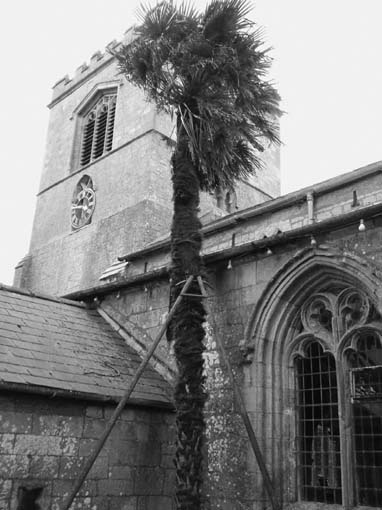
The mysterious palm tree growing next to the St Peter and St Paul Church porch in Ingoldmells, Skegness.
There is a tale surrounding St Mary’s Church in Stow, which is supposed to stand on the site of a miracle. Around
AD
670, the Northumbrian Queen Etheldreda was fleeing across Lincolnshire to Ely, when she stopped to rest at Stow. It was a
tremendously hot day and the poor lady had no shade in which to rest, and so had to make do with what she found. Lying on the grass she stuck her staff in the soil beside her and fell asleep but when she awoke, she found that her staff had put forth branches and leaves to protect her from the sun. The staff grew into a huge ash tree and pilgrims travelled far and wide to visit it. Now there is an extremely large church on the spot, one much too big for the small village of Stow, but people call it the ‘Mother of Lincoln Cathedral’. There is a stained-glass window left of the altar to illustrate the legend.
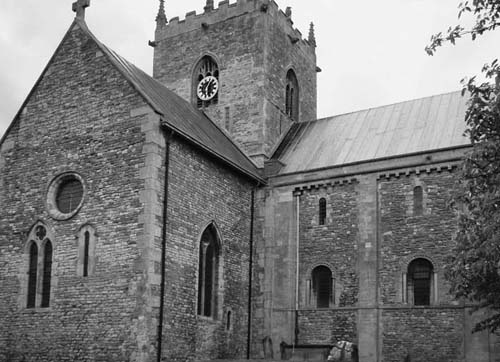
St Mary’s Church, also known as Stow Minster, situated on the site of a miracle.
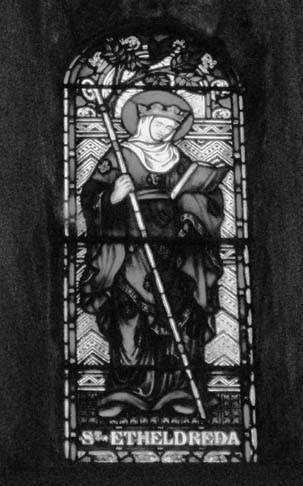
Victorian stained-glass window, high up on the north wall of the chancel, to the left of the alter in Stow Minster, depicting Etheldreda and her staff.
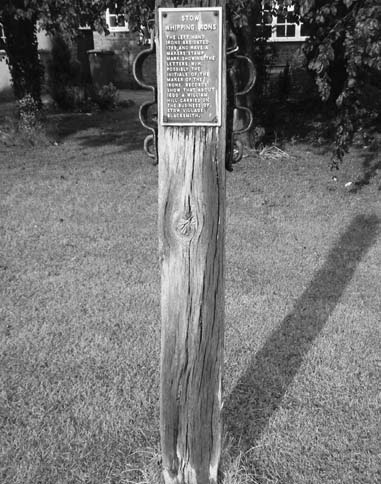
Just outside Stow Minster are some whipping irons dating back to 1789, complete with the maker’s stamp mark.
Codd also relates the story of a poor post boy who was savagely slain by two highway men.
17
Legend has it that the murder was so horrific that the grass around the lad’s grave at Nettleham refused to grow.
Gutch and Peacock mention a legend surrounding a black stone at Crowle.
18
Apparently it was believed that if the stone was removed from the farmyard then all the cattle would die within a year. It was even reputed to have happened to one particular farmer, but the stone was replaced after this incident.
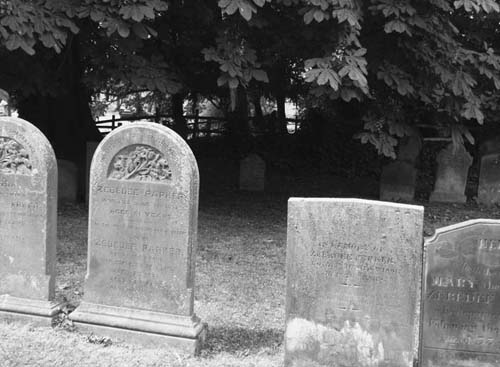
The gravestone under the tree, with no grass growing around it, is found in Nettleham churchyard, to the left-hand side of the church. Tho Gardiner is named as the post boy of Lincoln, ‘barbarously murdered by Issac & Tho Hallam Jan 3rd 1732. Aged 19’.
‘Were you born in a barn?’ This is a common saying for someone who habitually leaves doors open after them, but there is a village in Lincolnshire which has customised the saying to suit a miracle that happened in their area. Bardney was once the home of Tupholme Abbey where King Oswald of Northumbria’s remains
were taken after he was defeated in battle against King Penda of Mercia, in
AD
675. However, upon arrival, the monks left the King’s remains out in the field, as they regarded him as an enemy. Later that day, they were amazed to see the spot where they had left the dead King lit up with a bright beam of light from the heavens. They took the sign as a warning from God to treat everyone equally and not to close their doors to anyone. Thus the saying, ‘You must have been born in Bardney!’
It has been said that once, no mice or rats were to be found at Fishtoft. The legend stated that so long as the whip in the hand of the statue of St Guthlac, in the church, was intact, the village would be free from mice and rats. Unfortunately for the residents, the whip is now long gone.
Gutch and Peacock relate a strange old folk belief that if you wanted to know whether a mare was with foal or not, one had to take a mouthful of water and spit it violently into the beast’s ear.
19
If she shook her head it was a sign she was with foal whereas if she shook her whole body then she was not.
A white blemish on the thumb nail was said to foretell the arrival of a present. Each finger also held a different omen if the mark appeared on them; friendship, an altercation, romance and an imminent journey.
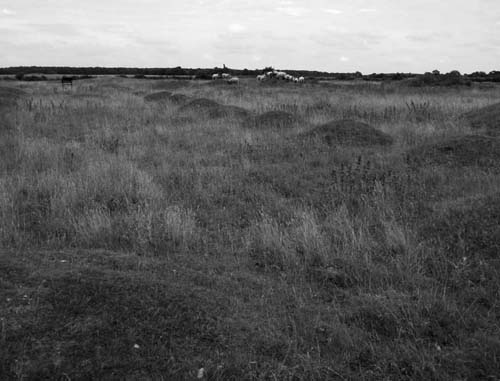
The ruins of Bardney Abbey, just across the field from a car parking area; signposted from the village.
